
10 Great Audiobooks in Translation
Only three percent of books published every year in the United States are books that have been translated. Of those books, only twenty-nine percent are by women. There is a huge imbalance is the publishing industry, and it gets even more challenging if you depend on the accessibility of audiobooks.
Not all published books are made into audiobooks. This is especially true of books published by small presses, which is a huge area of the market for translated books. Publishers make very little money on audiobook sales, and that’s after the high price of production, so it doesn’t always make financial sense to produce a book on audio.
I rely on audiobooks for half of my reading. I love Audible, but they’ve cornered the audiobook market, and it’s very hard to be an audiobook listener without having an Audible subscription. Of the ten books I’ve listed below, only six were available on my OverDrive, and those were the more widely recognized authors like Roberto Bolaño, Isabel Allende, Svetlana Alexievich, Haruki Murakami, Elena Ferrante, and Han Kang, and all published by large publishing houses (except Europa). The discrepancy has a lot to do with the price of production, and the return on sales. Also, ACX (Audible’s platform for self- producing audiobooks) only distributes audiobooks to Audible, iTunes, and Amazon; they are not available to library platforms like OverDrive. For people who love both audiobooks and books in translation, and have a tight budget, this is very frustrating, and I hope in the years to come, more translated books will be made available as audiobooks.
For now, here are 10 great audiobooks in translation:
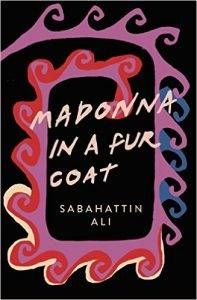 Madonna in a Fur Coat by Sabahattin Ali, Translated by Maureen Freely, read by Robert Fass
Madonna in a Fur Coat by Sabahattin Ali, Translated by Maureen Freely, read by Robert Fass
I loved this book. It was so beautiful. This is one of my all-time favorite quotes: ‘Do you know why I hate you? You and every other man in the world? Because you ask so much of us, as if it were your natural right…Mark my words, for it can happen without a single word being uttered…it’s how men look at us and smile at us. It’s how they raise their hands. To put it simply, it’s how they treat us…you’d have to be blind not to see how much confidence they have, and how stupidly they achieve it. And if you need a measure of their arrogant pride, all you need is to see how shocked they are when an advance is rejected. They are the hunters, you see. And we their miserable prey. And our duties? To bow down and obey, and give them whatever they want…But we shouldn’t. We shouldn’t give away a single bit of ourselves. It’s revolting, this arrogant male pride…Do you understand what I’m saying?
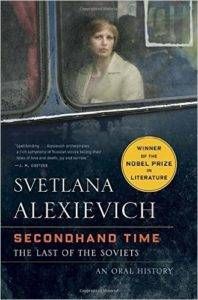 Secondhand Time: The Last of the Soviets by Svetlana Alexievich, Translated by read by a full cast (a GREat recording!)
Secondhand Time: The Last of the Soviets by Svetlana Alexievich, Translated by read by a full cast (a GREat recording!)
I adore Svetlana Alexievich. Rather than calling her a writer (which she is), I consider her to be a listener (all great writers are listeners) with an ear for tragedy. Her stories are not happy. Ever. But, Alexievich, through her stories, allows people to regain their personhood: You are important, let your story be remembered. A favorite book, and a great recording.
“It’s good of God to have given man cats and dogs…and trees and birds…He gave man everything so that he would be happy and life wouldn’t seem too long. So life wouldn’t wear him down. The one thing I haven’t gotten sick of is watching the wheat turn yellow. I’ve gone hungry so may times that the thing I love best is ripening grain, seeing the sheaves sway in the wind. For me, it’s as beautiful as the paintings in a museum are for you.”
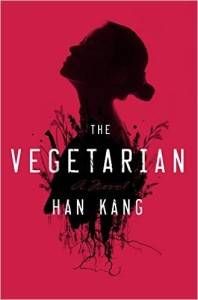 The Vegetarian by Han Kang, Translated by Deborah Smith, read by Janet Song & Stephen Park
The Vegetarian by Han Kang, Translated by Deborah Smith, read by Janet Song & Stephen Park
A haunting story, the audiobook is read very well by a male and female reader. This story is split into three different narrations. First is Yeong-hye’s husband, then Yeong-hye’s brother- in- law, and last is In-hye, Yeong-hye’s sister. The men refer to Yeong-hye in common terms like “my wife” or just refer to her as a pronoun, rather than an individual. She is often dehumanized throughout the book. Yeong-hye never has her own section, and through other people we begin to understand a bit of her motivations as she slowly stops eating, but Yeong-hye laments to her sister, “You’re just the same…No one understands me…the doctors, the nurses, they’re all the same…they don’t even try to understand…they just force me to take medication, and stab me with needles.”
Sometimes what we eat and when we eat is the only control we have of our world.
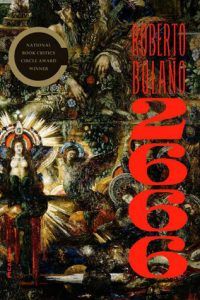 2666 by Roberto Bolaño, Translated by Natasha Wimmer, read by John Lee, Armando Duran, G. Valmont Thomas, Scott Brick, and Grover Gardner
2666 by Roberto Bolaño, Translated by Natasha Wimmer, read by John Lee, Armando Duran, G. Valmont Thomas, Scott Brick, and Grover Gardner
I was researching Patti Smith’s favorite books, because I was curious to see what poetry had influenced her, and I found her favorite classics on the Open Culture website (poetry she loves: Rimbaud). That’s where I discovered that she loves Roberto Bolano. She called 2666 “the first masterpiece of the 21st century.” A bold proclamation that convinced me to buy the door- stopper of a book right away (I’m easily talked into buying books). I also checked the audiobook, because 2666 is over 1,000 pages, and I thought it might be easier to listen to. With narrators like John Lee, Armando Duran (who reads most of Gabriel Garcia Marquez’s books), Scott Brick, and Grover Gardner, I was almost convinced to buy the audiobook. I listened to a sample, and, oh boy, it sounds good!
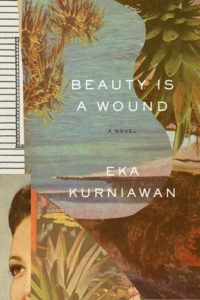 Beauty is a Wound by Eka Kurniawan, Translated by Annie Tucker, read by Johnathan Davis
Beauty is a Wound by Eka Kurniawan, Translated by Annie Tucker, read by Johnathan Davis
The best book I’ve read this year! I would utter Eka Kurniawan’s name in the same breath I would say Gabriel García Márquez, but Kurniawan was apparently heavily influenced by Gogol and Melville, not Márquez, which shocked the socks off me. This is a stunning history of Indonesia after World War II. The first sentence: “One afternoon on a weekend in May, Dewi Ayu rose from her grave after being dead for twenty-one years.” Are you hooked? The audiobook is read by Johnathan Davis who does a great job (even though it might have been nice to have a female narrator too…).
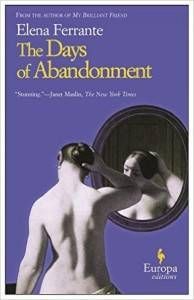 The Days of Abandonment by Elena Ferrante, Translated by Ann Goldstein, read by Hillary Huber
The Days of Abandonment by Elena Ferrante, Translated by Ann Goldstein, read by Hillary Huber
Sometimes, in dark times, it’s nice to have another voice beside you. This is a dark novel, and listening to the audiobook might help alleviate some of the desolation of the narrative. “One April afternoon, right after lunch, my husband announced that he wanted to leave me. He did it while we were clearing the table; the children were quarreling as usual in the next room, the dog was dreaming, growling beside the radiator.”
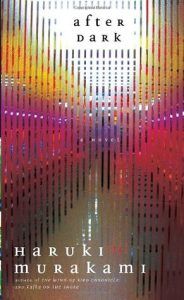 After Dark by Haruki Murakami, Translated by Jay Rubin, read by Janet Song
After Dark by Haruki Murakami, Translated by Jay Rubin, read by Janet Song
“Time moves in a special way in the middle of the night.” This is my favorite Murakami. It’s short, which is in contrast with his other novels, which range in length from The Wind-Up Bird Chronicle at 26 hours, to 1Q84 at 46 hours; not that they’re not worth the time, but, LORD—46 hours is almost two days! After Dark is a quiet book that takes place during one night in Tokyo. It is a lonely story filled with weird happenings and secrets. Perfect to listen to while taking a late night walk.
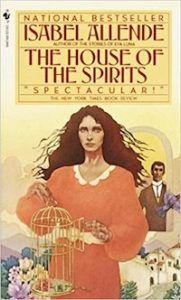 The House of Spirits by Isabel Allende, Translated by Magda Bogin, read by Thom Rivera and Marisol Ramirez
The House of Spirits by Isabel Allende, Translated by Magda Bogin, read by Thom Rivera and Marisol Ramirez
This was the book I read for Women in Translation Month. It had been on my TBR for years, but I’d never picked it up for a variety of reasons. This year I’ve been reading a lot of translated books from Latin America, and I thought it was high time I read a book by Isabel Allende. I loved it. It’s a beautiful book filled with magical realism, and Dickensian depictions of social class (Allende’s much more friendly towards her female characters). The audiobook is read with a male and female narrator, which enhances the storytelling.“Barrabas came to us by sea, the child Clara wrote in her delicate calligraphy. ”
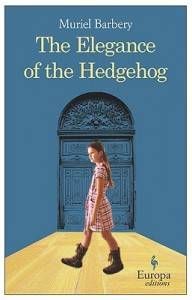 The Elegance of the Hedgehog by Muriel Barbery, Translated by Alison Anderson, read by Barbara Rosenblat and Cassandra Morris
The Elegance of the Hedgehog by Muriel Barbery, Translated by Alison Anderson, read by Barbara Rosenblat and Cassandra Morris
Listen to a sample of this audiobook and I dare you not to fall in love with it right away. Barbara Rosenblat reads the Amelia Peabody series, Judy Moody, and an assortment of other books. I love her deep, rich voice, and her French pronunciation (which sounds good to a non- French speaker). And the book: “When tea becomes ritual, it takes its place at the heart of our ability to see greatness in small things. Where is beauty to be found? In great things that, like everything else, are doomed to die, or in small things that aspire to nothing, yet know how to set a jewel of infinity in a single moment?” This is a book filled with delightfulness.
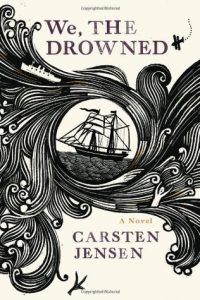 We, the Drowned by Carsten Jensen, Translated by Charlotte Barslund, Liz Jensen, Emma Ryder, read by Simon Vance
We, the Drowned by Carsten Jensen, Translated by Charlotte Barslund, Liz Jensen, Emma Ryder, read by Simon Vance
Okay, when a book is read by Simon Vance it’s just gotta be good, right? I haven’t read/listened to this book yet. I’ve had it on my Kindle for years, but like so many books on my Kindle, it’s been forgotten. I bought this when I was going through a Charles Dickens phase. It’s a book about shipwrecks and social change during the 1800s. I don’t know that the Dickens comparison is relevant, but I bought it for its quirky-sounding description, its density (remember, I was on a Dickens kick, so I thought good books had to be thick), its promise of a village run by women, shrunken heads, and bloodshed. I also love a good swashbuckling adventure and family drama.
If you’re looking for free audiobooks in translation, try the Open Culture website, which has a whole host of classic audiobooks available. And if you’re looking for more translated books, try Book Riot’s In Translation page!





